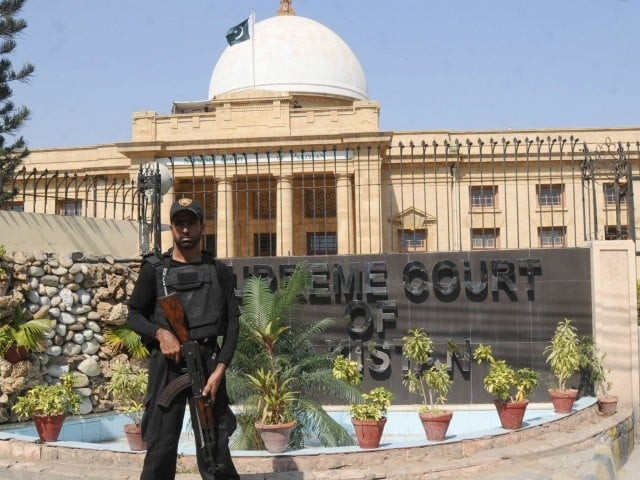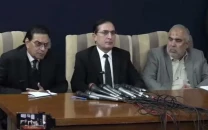Government fails to satisfy Supreme Court on treatment plants issue
Apex court declares to pursue enforcement of prime fundamental rights of person and property

Supreme Court Karachi Registry. PHOTO: FILE
At a hearing of multiple cases at the Karachi Registry of the SC on Tuesday, Chief Justice of Pakistan (CJP) Saqib Nisar, who was heading a bench comprising him, Justice Faisal Arab and Justice Sajjad Ali Shah, inquired from the Sindh Advocate-General (AG) Barrister Zamir Ghumro and Chief Secretary Muhammad Rizwan Memon about steps taken by the provincial government for the treatment of domestic and industrial waste before safe disposal.
The top judge told the chief secretary that he or any other responsible officer must give a written undertaking, supported by a personal affidavit, that clearly gave a timeline for the completion of the relevant projects.
He cautioned that in case such a timeline was not met, the court would initiate contempt of court proceedings against the respective officer for 'breaching of the undertaking'.
Govt has two months to act against ‘patchy’ cops
"This is a question of the health of my nation," CJP remarked, adding that the court proceedings were not meant for the purpose of any publicity.
"In the future, the Supreme Court will strive for two basic fundamental rights; the right to person and the right to property," Justice Nisar announced. He observed that it was the duty of the state to provide the facilities of health under the right to person. "Right to health is inseparable to the right to person," the CJP declared.
The CJ expressed dissatisfaction over the replies of AG Ghumro about steps taken by the government to stop disposal of untreated domestic and industrial waste into the water sources.
Responding to a query, the chief secretary informed the court that there were five industrial zones in the city -SITE, North Karachi, Landhi, Korangi and Federal B Area - but none had an effluent treatment plant until the Supreme Court highlighted the issue in its March 2017 order.
SC seeks master plan of Karachi
CJP reminded the law officer that 450 million gallons of untreated industrial waste was generated in Karachi every day, but the five combined effluent plants that should have been built much earlier in the five industrial areas of the city to treat the waste before disposing off in the sea were still not completed.
"So, did this issue not exist before March 2017 or was it not considered as serious by the provincial governments or was never attended to?" the CJP inquired from the chief secretary who remained silent.
The top judge remarked the court was not an adversary to the government but the issue of untreated waste concerned public health at large and so the court could not ignore it. He said the court, if needed by the provincial government, will provide a shoulder to get the issues related to provision of finance and coordination resolved with the federal government which was also involved in the installation of combined effluent treatment plants.
An official informed the apex court that in 2005, the federal and the provincial governments had agreed to set up five CETPs by agreeing to contribute 50% of the funds each.
Top court irked by DHA's failure to comply with 5-year-old orders to demolish illegal shops
The Sindh government was ready to pay its share, but a PC-I of the project was sent to the federal government, which directed to approach the climate change department, but the latter rejected the same, the officer informed the bench, adding that when the provincial government approached the Centre again, it was told the approach the planning commission.
The bench was also informed that in the meeting of the Executive Committee of National Economic Council (Ecnec) held last month, it had been agreed that the federal government would contribute 33% of the funds, while the Sindh government would provide rest of the funds required for the project. The bench was informed that in the upcoming meeting of the Ecnec, which is held once in a month, a summary would be hopefully approved.
Solid waste
The bench also took up the matter relating to disposal of the solid waste.
The chief secretary informed the SC that under the Sewerage-III project, setting up of three treatment plants - TP-I, II and III - was in the process while the work on the fourth plant would start soon.
SC gives two days to clear amenity plots in Karachi
To the court's query, Memon informed that TP-I and TP-III, which have the capacity to treat 100 and 180 million of gallons per day (MGD) of effluent respectively, were being rehabilitated on the orders of the judicial commission and would start functioning by June 2018. He said the land of TP-II was, however, encroached upon.
Addressing Memon, the CJP remarked that the work on only two plants had started as the officer admitted that a housing scheme had been launched on the location of TP-II.
Memon informed the court that according to the experts, the fourth plant would have a capacity to treat 180 MGD effluent. The matter was adjourned till December 23.



















COMMENTS
Comments are moderated and generally will be posted if they are on-topic and not abusive.
For more information, please see our Comments FAQ